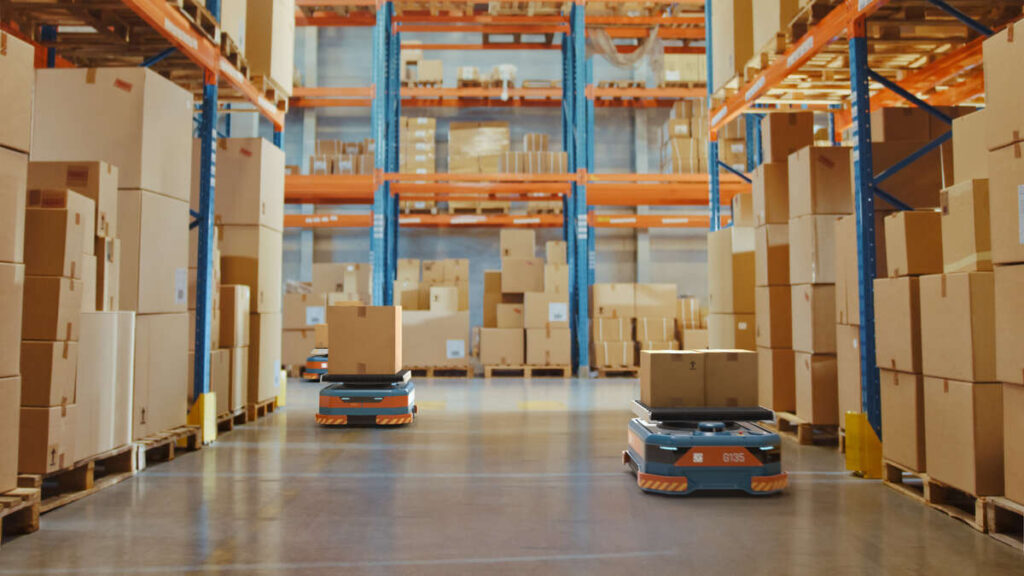Selecting the optimal battery for your fleet of Automated Guided Vehicles (AGV) or Autonomous Mobile Robots (AMR) is crucial for efficient and reliable operation in whatever application you use them for.
Table of Contents:
Selecting the optimal battery for your fleet of Automated Guided Vehicles (AGV) or Autonomous Mobile Robots (AMR) is crucial for efficient and reliable operation in whatever application you use them for. The battery not only powers their motors but also influences their performance and maintenance needs, ultimately culminating in their overall efficiency and – importantly – your costs. We’ve prepared a comprehensive AGV battery selection guide to help you understand how these machines operate and how the different batteries available on the market today fill those needs.
Understanding the power needs of AGVs and AMRs
Before we dive into what the best battery for AGVs is, let’s briefly explain what we’re dealing with here.
- AGVs (Automated Guided Vehicles), follow predefined paths to move around between different points and perform tasks like loading, unloading, and other kinds of material handling.
- AMRs (Autonomous Mobile Robots) are similar in general operation, but they differ strongly in regard to what determines their movement. Here, instead of fixed pathways, it’s smart navigating systems and advanced, AI-powered sensors that guide them, making them more adaptable to changing environments.
What remains unchanged, though, is that both AGVs and AMRs require reliable and efficient power sources for optimal functioning. Just as in the case of power tool batteries or e-bike batteries, the variety of available choices makes it easy to get confused. That’s why, in the next section, we’ll break down the most commonly selected options for AGVs and AMRs, and hopefully point you in the direction of what the best battery for an AGV is in your case.
AGV battery selection guide – The line-up
Let’s take a look at the battery types commonly used in AGVs and AMRs:
AGV batteries
Here, we encounter a battle between the old and the new:
- Lead-Acid Batteries: Somewhat counterintuitively, many AGVs still run on lead-acid batteries, which at this point are a dated technology, to say the least. However, because AGVs are heavier than AMRs, they often require energy in big bursts to maintain operation – something lead-acid batteries can easily provide. On the flip side, they are heavier, bulkier, have shorter lifespans, and charge much slower than their modern counterparts.
- Lithium-Ion Batteries: These are becoming the gold standard in nearly all industries. Li-ion batteries are more reliable, cleaner for the environment, easier to maintain and charge, and last for many, many more charge cycles compared to lead-acid. Their only downside, really, is that they’re more expensive.
AMR batteries
In AMR batteries, lithium-ion batteries are just as prevalent due to their long life, fast charging, and high energy density. But generally speaking, AMRs work slightly differently in that they’re lighter and less intense to operate, so lead-acid batteries have not really found widespread use here.
In their place, another key player emerged – the lithium iron phosphate batteries (LiFePO4). These offer enhanced safety due to their thermal stability, long cycle life, and minimal maintenance requirements. This makes them ideal for continuous and dynamic AMR operation.
Which battery should you choose, then?
As with everything, the choice of the best battery for AGVs or AMRs will come down to your needs. When high-burst power for heavy lifting at a lower cost is what you want to prioritize, lead-acid might still be an option worth considering despite its significant drawbacks.
However, for AGVs operating in less intense conditions, and especially for AMRs that demand longer operation, faster charging, and minimal maintenance, lithium-ion or LiFeEPO4 batteries are clearly the superior choice. Their long-term value is greater even in spite of the higher initial investment. Plus, lead-acid industries do not see nearly as much innovation by today’s standards, meaning the other options will always outperform in the long run thanks to improvements to various systems and components, like the crucial BMS.
The takeaway
Selecting the right battery is a critical decision for your enterprise and a big investment, too. It should encompass understanding operational needs and estimating the breadth of the upfront cost you’re ready to bear in exchange for longevity and efficiency.
Read also: How and Where Are Lithium-Ion Batteries Used?
What key factors should you consider when selecting a battery for an AGV (Automated Guided Vehicle) or AMR (Autonomous Mobile Robot)?
How do battery chemistry types compare and which are appropriate for AGVs or AMRs?
How should you decide which battery type to choose for your specific AGV or AMR application?
About the Author
EMBS
Leading manufacturer of advanced battery systems with a market presence of over 25 years. We specialise in rechargeable lithium-ion batteries, producing a wide range of systems with varying power and capacity.
